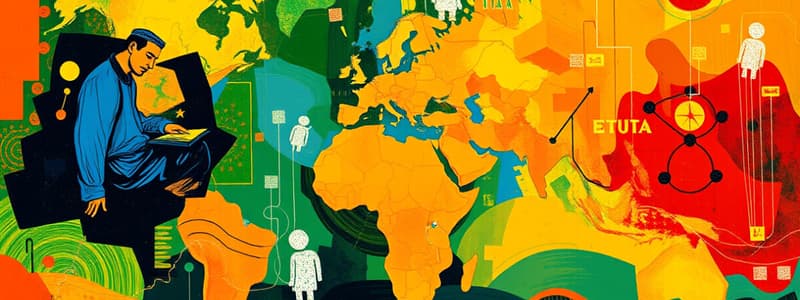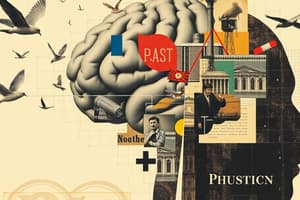Podcast
Questions and Answers
What primary benefit does Human Capital Development provide in the context of the global economy?
What primary benefit does Human Capital Development provide in the context of the global economy?
- It encourages traditional respect for cultural norms.
- It fosters a sense of nationalism and local pride.
- It equips individuals with skills necessary to navigate various economic environments. (correct)
- It enhances creative thinking and artistic expression.
How does education contribute to Cultural Exchange and Understanding?
How does education contribute to Cultural Exchange and Understanding?
- By facilitating awareness and appreciation of diverse cultures and perspectives. (correct)
- By enforcing a singular cultural narrative.
- By promoting isolation from diverse cultures.
- By limiting exposure to foreign languages.
What is a significant impact of Language Proficiency achieved through education?
What is a significant impact of Language Proficiency achieved through education?
- It enhances the ability to communicate across cultural and linguistic divides. (correct)
- It simplifies cultural communication by eliminating the need for diverse languages.
- It reduces the need for translation services in educational settings.
- It restricts international communication to dominant languages.
Which skills are primarily developed through Global Citizenship Education?
Which skills are primarily developed through Global Citizenship Education?
What role does education play in fostering international participation?
What role does education play in fostering international participation?
What is a primary consequence of cultural homogenization in education?
What is a primary consequence of cultural homogenization in education?
What challenge arises from the standardization of education?
What challenge arises from the standardization of education?
How does the digital divide affect education?
How does the digital divide affect education?
What is indicated by the skill mismatch in the context of globalization?
What is indicated by the skill mismatch in the context of globalization?
What potential benefit does digital technology have in education?
What potential benefit does digital technology have in education?
Flashcards are hidden until you start studying
Study Notes
Human Capital Development
- Education equips individuals with essential skills and competencies for effective participation in the global economy.
- Higher education levels enable adaptability to new technologies and enhance economic development potential.
Cultural Exchange and Understanding
- Education fosters cross-cultural communication, promoting tolerance and respect through exposure to diverse cultures and viewpoints.
Language Proficiency
- Educational systems facilitate the acquisition of new languages, enhancing communication across linguistic barriers and improving teamwork in international contexts.
Global Citizenship Education
- Education instills competencies such as empathy, social responsibility, and critical thinking, essential for global citizenship.
Cultural Homogenization
- Globalized curricula can lead to cultural homogenization, diminishing local identities and resulting in the loss of indigenous knowledge.
Standardization vs. Localization
- Educational systems face challenges in balancing local cultural needs with the requirement for global standardization in education.
Digital Divide
- Significant disparities exist in access to digital technologies, exacerbating educational inequalities despite the potential for improved learning.
Skill Mismatch
- Rapid globalization creates a demand for new skills, often resulting in a gap between education outcomes and labor market requirements.
Privatization and Commercialization
- Increased privatization in education can jeopardize quality and equality, prioritizing profit over educational objectives.
Brain Drain
- Globalization facilitates the migration of skilled individuals, leading to a brain drain that exacerbates talent shortages and hampers economic growth in their home countries.
Language Barriers
- Globalization affects language policy in multilingual settings, often marginalizing minority languages and requiring coordinated efforts for inclusivity in education.
National Education Crisis in the Philippines
- Systemic issues such as inadequate funding, outdated curricula, and access disparities hinder quality education for Filipinos.
Inadequate Funding
- Continuous underfunding of the education system restricts resources necessary for high-quality education, impacting student performance and critical thinking abilities.
Recommendations for Addressing the Crisis
- Increase Funding: Prioritize educational budgets to meet infrastructure, teaching quality, and student outcome improvements.
- Curricular Reform: Update the curriculum to focus on 21st-century skills, including digital literacy and critical thinking relevant to Filipino needs.
- Equitable Access to Education: Implement policies to enhance infrastructure and create more scholarships, targeting underserved populations.
- Teacher Training and Support: Invest in professional development to elevate teaching quality and support educators’ well-being.
Impact of Globalization on Healthcare
- Globalization has considerably influenced public health outcomes, healthcare delivery, and technology access.
Access to Medical Technologies
- Globalization improves access to medical technology, enhancing disease detection, treatment, and prevention through cross-border trade and investment.
Health Tourism and Cross-Border Healthcare
- Growth in cross-border healthcare services and health tourism reflects the impacts of globalization, providing more options for patients globally.
Studying That Suits You
Use AI to generate personalized quizzes and flashcards to suit your learning preferences.




